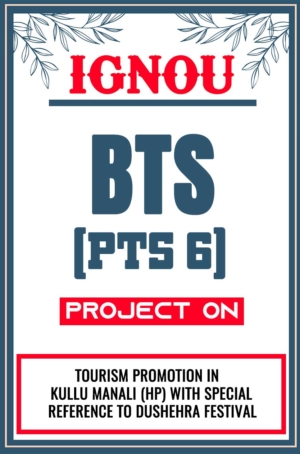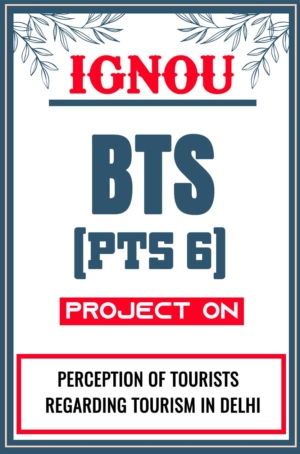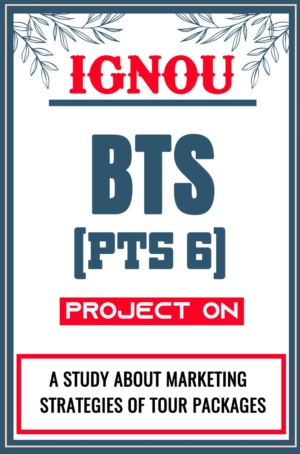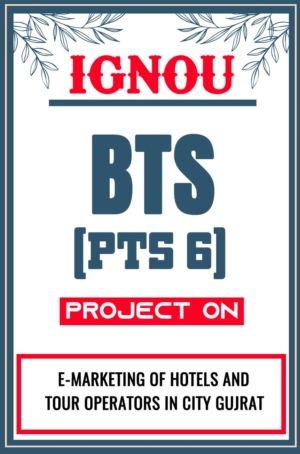Download IGNOU DTS Project for PTS 4, 5, 6
The IGNOU DTS Project for PTS 4, 5, 6 is integral components of the Diploma in Tourism Studies at IGNOU. This IGNOU DTS Project is designed to deepen your understanding of tourism-related topics, industry practices, and their practical applications. Students are tasked with researching specific aspects of tourism, analyzing industry trends, and presenting their findings in a comprehensive project report. Under the guidance of experienced professionals in the field of tourism, students explore various dimensions of tourism management, marketing, and sustainability.
Whatsapp us to get the Personalized (Customized) IGNOU DTS Project Report and Synopsis for PTS 4, 5, 6
What is the format for submitting the IGNOU DTS Project?
The format for submitting the DTS project typically follows a structured format. While specific requirements might vary, here’s a general guideline you can follow:
1. Title Page
- Title of the Project
- Name of the Student
- Enrollment Number
- Programme Name
- Project Guide’s Name (if applicable)
- Regional Centre
- Date of Submission
2. Acknowledgements
- A brief section to thank individuals or organizations that assisted in the project.
3. Table of Contents
- A list of the sections and sub-sections with page numbers.
4. List of Figures/Tables
- If applicable, include a list of figures and tables used in the project with page numbers.
5. Executive Summary
- A concise summary of the project, including the objectives, methodology, findings, and recommendations. Typically around 1-2 pages.
6. Introduction
- Background information on the topic.
- Objectives of the project.
- Significance and scope of the study.
7. Literature Review
- Review of existing research or literature related to the project topic.
8. Methodology
- Description of the methods and procedures used for data collection and analysis.
9. Results and Discussion
- Presentation of findings.
- Analysis and interpretation of the results.
10. Conclusion
- Summary of findings.
- Implications of the study.
- Recommendations for future work or practical applications.
11. References/Bibliography
- List of sources cited in the project report. Follow a standardized referencing style as prescribed by IGNOU or your academic advisor.
12. Appendices
- Include any additional material such as questionnaires, interview transcripts, data tables, or other supporting documents.
What is the primary focus of the IGNOU DTS Project (PTS 4)?
The primary focus of the PTS 4 project in the IGNOU DTS program is on Tourism Product Development. This project involves creating or enhancing a tourism product or service, and it emphasizes several key aspects:
Primary Focus Areas for PTS 4 Project:
Tourism Product Creation/Enhancement:
- Develop a new tourism product or enhance an existing one. This includes conceptualizing the product, designing it, and planning its development.
Market Research and Analysis:
- Conduct thorough market research to understand the needs and preferences of potential tourists. Analyze market trends, competition, and consumer behavior to ensure the product meets market demands.
Product Design and Features:
- Detail the product’s features, benefits, and unique selling points. This includes planning the product’s features, experiences, and value propositions that make it attractive to tourists.
Marketing and Promotion:
- Develop a marketing plan to promote the tourism product. This includes strategies for branding, advertising, and reaching the target audience.
Implementation Plan:
- Create a detailed plan for launching the product. This should include timelines, resources needed, and the steps required to bring the product to market.
Evaluation and Improvement:
- Plan for monitoring and evaluating the success of the product. This involves setting up metrics for performance assessment and strategies for making improvements based on feedback and performance data.
Can you use a real tourism product for your IGNOU DTS Project?
Yes, you can use a real tourism product for your PTS 4 project in the IGNOU DTS program. Analyzing or enhancing an existing tourism product can provide valuable insights and practical experience. Here’s how you can approach it:
Using a Real Tourism Product for PTS 4 Project:
- Select a Relevant Product: Choose a tourism product that interests you and has potential for analysis or improvement. It could be a destination, tour package, accommodation, activity, or any other tourism-related service.
- Conduct Thorough Research: Gather detailed information about the existing product, including its features, target market, pricing, and competition. Use various research methods such as surveys, interviews, and secondary data analysis to understand its current market performance.
- Analyze the Product: Evaluate the strengths, weaknesses, opportunities, and threats (SWOT analysis) of the product. Identify areas where improvements can be made or new features that could be introduced.
- Develop Recommendations: Based on your analysis, propose recommendations for enhancing the product. This could involve modifications to the product design, marketing strategies, or customer service improvements.
- Prepare a Detailed Report: Document your findings, analysis, and recommendations in a well-organized project report. Include sections on market research, product analysis, proposed changes, and implementation strategies.
- Consider Ethical and Practical Aspects: Ensure that your analysis respects the privacy and intellectual property rights of the company or organization behind the tourism product. Obtain necessary permissions if required.
What should be included in the marketing strategies for IGNOU DTS Project (PTS 5)?
Your marketing strategies should be comprehensive and well-rounded. Here’s what should typically be included:
Components of Marketing Strategies for PTS 5:
Market Research:
- Market Analysis: Research the tourism market to understand trends, demands, and competition.
- Target Audience: Define and analyze the characteristics of your target audience, including demographics, preferences, and behaviors.
- Competitor Analysis: Study competitors’ marketing strategies, strengths, and weaknesses to identify opportunities for differentiation.
Unique Selling Proposition (USP):
- Differentiation: Highlight what makes the tourism product or service unique compared to competitors. This could be special features, unique experiences, or exclusive offers.
Marketing Objectives:
- Goals: Set clear and measurable marketing objectives, such as increasing brand awareness, generating leads, or boosting sales.
- KPIs: Define Key Performance Indicators (KPIs) to track the success of your marketing efforts.
Marketing Mix (4 Ps):
- Product: Describe the tourism product, including its features, benefits, and how it meets the needs of the target audience.
- Price: Develop a pricing strategy that reflects the value of the product and aligns with the target market’s willingness to pay.
- Place: Identify the distribution channels through which the product will be available, such as travel agencies, online platforms, or direct sales.
- Promotion: Create a promotion plan that includes advertising, public relations, digital marketing, and other methods to reach and engage the target audience.
Digital Marketing Strategies:
- Website: Ensure the product or service has a user-friendly, informative website.
- Social Media: Utilize social media platforms to promote the product, engage with potential customers, and build a community.
- Content Marketing: Create valuable content such as blogs, videos, or infographics to attract and inform potential customers.
- SEO/SEM: Implement Search Engine Optimization (SEO) and Search Engine Marketing (SEM) to improve online visibility and attract traffic.
Offline Marketing Strategies:
- Print Media: Use brochures, flyers, and other print materials to reach potential customers.
- Events: Participate in or organize events, exhibitions, or trade shows to showcase the product.
- Partnerships: Collaborate with other businesses or tourism boards to expand reach and credibility.
Promotional Campaigns:
- Advertising: Plan and execute advertising campaigns across various media, including online, print, and broadcast.
- Special Offers: Develop special promotions, discounts, or packages to attract customers.
- Public Relations: Build relationships with media and influencers to gain coverage and endorsements.
Budget and Resource Allocation:
- Budget Planning: Allocate a budget for each marketing activity and ensure it aligns with overall objectives.
- Resource Management: Identify the resources needed for implementing the marketing strategies, including personnel, tools, and technology.
Monitoring and Evaluation:
- Tracking: Monitor the performance of marketing activities using analytics tools and metrics.
- Evaluation: Assess the effectiveness of the marketing strategies and make adjustments as needed based on performance data.
Implementation Plan:
- Timeline: Develop a detailed timeline for executing marketing strategies and campaigns.
- Responsibilities: Assign responsibilities to team members or stakeholders involved in the marketing efforts.
What is the importance of monitoring and evaluation in IGNOU DTS Project (PTS 5)?
Monitoring and evaluation (M&E) are crucial components of the marketing strategies for PTS 5: Tourism Marketing in the IGNOU DTS program. Here’s why they are important:
Importance of Monitoring and Evaluation in PTS 5:
- Assess Effectiveness: Performance Measurement: M&E allows you to measure the effectiveness of your marketing strategies and activities. By tracking key performance indicators (KPIs), you can determine whether your marketing efforts are meeting the set objectives.
- Optimize Strategies: Continuous Improvement: Monitoring provides real-time data that helps in assessing what’s working and what’s not. This allows for timely adjustments to strategies, optimizing performance and enhancing outcomes.
- Ensure Accountability: Resource Management: Effective monitoring ensures that resources are used efficiently and that marketing activities are aligned with the budget. Evaluation helps in justifying the expenditure and demonstrating the value of marketing investments.
- Understand Customer Impact: Feedback Collection: Through evaluation, you can gather feedback from customers, understand their preferences, and measure satisfaction levels. This insight helps in refining the product and marketing strategies to better meet customer needs.
- Identify Trends and Patterns: Market Insights: Regular monitoring helps in identifying trends and patterns in customer behavior, market conditions, and campaign performance. This information can guide future marketing decisions and strategic planning.
- Measure ROI: Return on Investment: M&E helps in calculating the return on investment (ROI) of marketing activities. By analyzing the cost-effectiveness of various strategies, you can determine which activities yield the best results.
- Ensure Goal Alignment: Objective Tracking: Regular evaluation ensures that marketing activities remain aligned with the overall goals and objectives of the project. It helps in tracking progress towards achieving specific targets and outcomes.
- Enhance Decision-Making: Informed Decisions: Data from monitoring and evaluation provides valuable insights for making informed decisions about future marketing strategies. It helps in planning and executing more effective campaigns based on past performance.
- Report and Communicate Results: Stakeholder Communication: M&E provides evidence of the effectiveness of marketing strategies, which is useful for reporting to stakeholders, such as project sponsors, team members, or management. It helps in communicating the impact and success of the marketing efforts.
- Address Issues and Challenges: Problem Identification: Monitoring helps in identifying issues or challenges in real-time, allowing for prompt resolution. This proactive approach minimizes risks and ensures smoother execution of marketing activities.
What types of impacts should be assessed for IGNOU DTS Project (PTS 6)?
You should assess a range of impacts that tourism can have on a destination or tourism product. Here’s a breakdown of the types of impacts to consider:
Types of Impacts to Assess for PTS 6:
1. Economic Impacts:
- Employment Generation: Evaluate the number of jobs created in the tourism sector and related industries.
- Revenue Generation: Assess the income generated from tourism, including direct revenue (e.g., from tourist spending) and indirect revenue (e.g., multiplier effects on local businesses).
- Investment and Infrastructure: Examine investments in infrastructure and facilities driven by tourism, such as transportation, accommodation, and public services.
- Economic Diversification: Analyze how tourism contributes to diversifying the local economy and reducing dependency on other sectors.
2. Social Impacts:
- Cultural Exchange: Assess the impact of tourism on cultural exchange and understanding between tourists and local communities.
- Community Well-being: Evaluate how tourism affects the quality of life for local residents, including changes in social services, public safety, and community cohesion.
- Cultural Preservation: Examine whether tourism supports the preservation of local traditions, heritage, and cultural practices or leads to their commercialization or erosion.
- Social Equity: Analyze how the benefits of tourism are distributed among different segments of the community and whether it reduces or increases social inequalities.
3. Environmental Impacts:
- Resource Use: Assess the consumption of natural resources, such as water and energy, by tourism activities.
- Waste Management: Evaluate the impact of tourism on waste generation and management, including the effectiveness of waste disposal and recycling systems.
- Ecosystem Health: Examine the effects of tourism on local ecosystems, wildlife habitats, and biodiversity. This includes potential issues like habitat destruction, pollution, and the spread of invasive species.
- Sustainability Practices: Analyze the implementation of sustainable practices in tourism, such as eco-friendly accommodations, conservation efforts, and responsible tourism initiatives.
4. Cultural Impacts:
- Cultural Heritage: Evaluate the impact of tourism on tangible and intangible cultural heritage, including historical sites, monuments, and traditional practices.
- Cultural Identity: Assess how tourism influences the cultural identity of local communities and whether it leads to cultural homogenization or the reinforcement of local traditions.
- Tourist Behavior: Examine how tourists’ behaviors and attitudes affect local customs, social norms, and community values.
5. Political and Regulatory Impacts:
- Policy Development: Assess how tourism influences the development of local or national tourism policies and regulations.
- Governance: Evaluate the role of local governments and stakeholders in managing tourism and ensuring its sustainable development.
- Community Engagement: Analyze the extent to which local communities are involved in decision-making processes related to tourism development.
6. Health Impacts:
- Public Health: Assess the impact of tourism on public health, including the spread of diseases and the availability of health services for both tourists and residents.
- Mental Well-being: Evaluate the psychological and emotional effects of tourism on local communities, such as stress from increased visitor numbers or improved quality of life from economic benefits.
Ready to get your IGNOU DTS Project Report and Synopsis Sample PDF for PTS 4, 5, 6?
- Call us or WhatsApp us at: 9958947060, 9354637830
- Visit: SHRICHAKRADHAR.COM
-
Sale!

-
Sale!

IGNOU BTS Project (PTS 6) Synopsis/Proposal & Project Report/Dissertation in Soft-Copy (Sample-2)
Original price was: ₹499.00.₹149.00Current price is: ₹149.00. -
Sale!

IGNOU BTS Project (PTS 6) Synopsis/Proposal & Project Report/Dissertation in Soft-Copy (Sample-3)
Original price was: ₹499.00.₹149.00Current price is: ₹149.00. -
Sale!

IGNOU BTS Project (PTS 6) Synopsis/Proposal & Project Report/Dissertation in Soft-Copy (Sample-4)
Original price was: ₹449.00.₹149.00Current price is: ₹149.00. -
Sale!

IGNOU BTS Project (PTS 6) Synopsis/Proposal & Project Report/Dissertation in Soft-Copy (Sample-5)
Original price was: ₹499.00.₹149.00Current price is: ₹149.00. -
Sale!

IGNOU BTS Project (PTS 6) Synopsis/Proposal & Project Report/Dissertation in Soft-Copy (Sample-6)
Original price was: ₹499.00.₹149.00Current price is: ₹149.00. -
Sale!

IGNOU BTS Project (PTS 6) Synopsis/Proposal & Project Report/Dissertation in Soft-Copy (Sample-7)
Original price was: ₹499.00.₹149.00Current price is: ₹149.00. -
Sale!

IGNOU BTS Project (PTS 6) Synopsis/Proposal & Project Report/Dissertation in Soft-Copy (Sample-8)
Original price was: ₹499.00.₹149.00Current price is: ₹149.00. -
Sale!

IGNOU BTS Project (PTS 6) Synopsis/Proposal & Project Report/Dissertation in Soft-Copy (Sample-9)
Original price was: ₹499.00.₹149.00Current price is: ₹149.00.
